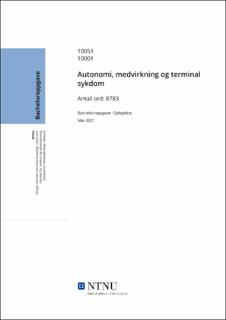| dc.contributor.advisor | Hunstad, Ingunn Klauseth | |
| dc.contributor.advisor | Vestnes, Arnhild Hammerås | |
| dc.contributor.author | Seljeset, Mona Sofie Nygård | |
| dc.contributor.author | Eikeland, Hanne Hernæs | |
| dc.date.accessioned | 2021-09-25T16:42:17Z | |
| dc.date.available | 2021-09-25T16:42:17Z | |
| dc.date.issued | 2021 | |
| dc.identifier | no.ntnu:inspera:82584963:82588927 | |
| dc.identifier.uri | https://hdl.handle.net/11250/2783362 | |
| dc.description.abstract | Hensikt: Hensikten med oppgaven er å bli faglig sterkere i forhold til ivaretakelse av pasientens autonomi og medvirkning i beslutningsprosesser vedrørende livsforlengende behandling og palliativ omsorg. Vi ønsker også å kunne videreformidle denne kunnskapen.
Metode: Oppgaven er en litteraturstudie, der vi gjennom struktur og systematikk har funnet 8 forskningsartikler som skal besvare problemstillingen vår «Hvordan kan sykepleier ivareta pasientens autonomi og medvirkning i forhold til livsforlengende behandling ved terminal sykdom». Pensum og annen litteratur har også blitt nyttet.
Resultat: Vi identifiserte fire hovedtemaer gjennom analysen: kommunikasjon og relasjon, informasjon, sykepleier som medmenneske og pasientadvokat, og sykepleiers kompetanse. Gjennomgående er viktigheten av god kommunikasjon og informasjon, sykepleierens kunnskap og verdier, sykepleier som talsmann, og pasientsentrert omsorg for å bevare pasientens autonomi og medvirkning.
Konklusjon: For å kunne ivareta pasientens autonomi og medvirkning må sykepleier ha tilstrekkelig kunnskap for å delta i samtaler om behandlingsvalg. Sykepleiere må også være klar over sin rolle som pasientadvokat og medmenneske. Gjennom å skape en god relasjon legger man til rette for god kommunikasjon og informasjon, og dermed bidrar til å fremme pasientens ønsker og preferanser. Tidlig planlegging bidrar også til å ivareta pasientens autonomi og medbestemmelsesrett. | |
| dc.description.abstract | Aim: The purpose of this study was to find the ways nurses can support the autonomy of patients with terminal illnesses, and right to participate in the desicion making process regarding life prolonging treatment and palliative care.
Method: The study is a literature review, where 8 studies were selected and analysed using a meta-analysis, with the aim to answer the question «How can nurses maintain patient autonomy and complicity in relation to life prolonging treatment in terminal illness?». We have also used other trusted literary sources.
Results: We identified four main categories through the analysis; communication and relation, information, the nurses role as the patients advocate and fellow human being, and the nurses competency. The importance of good communication and information is mentioned throughout, as well as values and knowledge.
Conclusion: In order to maintain the patient’s autonomy, the nurse needs the necessary knowledge in order to take part in converations about treatment options. Nurses also need to be aware of their role as the patients advocate. Through having a good relation to the patient, good communication and information is more likely. We also found that early interventions and planning contributes to patient autonomy. | |
| dc.language | nob | |
| dc.publisher | NTNU | |
| dc.title | Autonomi, medvirkning og terminal sykdom | |
| dc.type | Bachelor thesis | |
